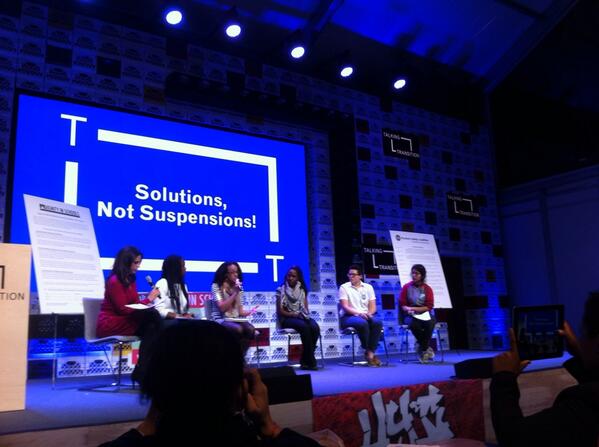
A discussion on school discipline (photo: @Teachers_Unite)
Since the founding of Bronx Lab School in 2004, "student discipline" has been an ongoing topic of discussion. Students, staff, and parents are continually debating the merits and efficacy of suspensions, detentions, and mediations in addressing the realities of student conflict and non-adherence to school policies and values. What we know for sure after more than a decade of these conversations is that there are no simple answers. What we have learned is, though, is that Restorative Justice supports our community's mission and values, and offers a humanizing approach to the ever-present "discipline" question.
Bronx Lab School first started exploring and investing in restorative justice practices a little more than a year ago; it's been an exhilarating but bumpy ride.
When an individual school – and for that matter, the educational system and society in which it resides – has a history of responding to harmful student behaviors using traditional, punitive methods, it's a tremendous philosophical shift to consider the alternative of a restorative approach. Students and teachers alike have been tacitly trained in many instances to criminalize student behavior: teachers want to file police reports for aggressive insubordination and students often consider police involvement an inevitability. I'll never forget when one of my students said to me last year after his involvement in a fight: "Miss, I'm a young man growing up in the Bronx, of course I knew one day I would end up in handcuffs. I just didn't know it would be today."
Inspired by our school community's commitment to justice in light of these realities, Bronx Lab embraced the possibility of another path.
A dozen staff members participated in week-long restorative justice trainings provided by the Department of Education; advisors started leading community-building circles on a weekly basis with their advisory classes; we formed a "visionary team" to work with Teachers Unite and Morningside Center; and our student affairs team began implementing tier two restorative mediations in response to student conflicts. These were just first steps in what will undoubtedly be a many-year, ongoing journey. Already we have committed dozens of hours of unbudgeted preparation and professional development, not to mention countless hours of research, reflection, and recruitment.
During our first year foray into restorative justice, we've had some beautiful moments of success, but the lingering question of sustainability is ever-present. At last June's staff retreat, one of our own teachers led a powerful circle on belonging - together, a group of 30 colleagues recounted personal stories and bonded over shared values. We cried and we laughed, and we understood through lived experience the power of circle in building community. We were transformed; we were hooked.
In January, I facilitated a 90-minute post-suspension circle to repair the harm following a fight involving three Bronx Lab students. Community-building sometimes involves restoring relationships through conflict resolution. Participants in this circle included six staff members, three students, and four parents, and it delivered as promised. By the end, one parent expressed that she felt like she'd "been to church," and the parents told all three students that any of the kids could reach out to any of them for support.
Students need consistency to feel safe and staff need it to be able to respond with a unified voice, but we simply do not have the infrastructure or capacity at this point to respond to conflict in a restorative manner every time. We don't have the systems in place to use restorative justice in every case, so we implement inconsistently. Teachers and advisors want to know, 'what do I do when students don't want to participate in our community building circle? How do I handle rude, aggressive, or threatening behavior from students without either ignoring the problem or kicking them out of school?'
The city Department of Education's recently-revised school discipline code supports the work we're doing - a restorative conference is now officially an acceptable response to almost every student infraction. But, building alternative accountability takes a lot of time and requires supports that schools don't necessarily have at this point.
Schools need funding for a full time restorative coordinator with the sole focus of coordinating a consistent, positive, restorative climate and approach to discipline at the school. We need the resources to train students, educators, and parent leaders in planning and implementing restorative practices in schools.
Restorative justice is a humanizing answer to much of what ails our schools, but it is a messy, slow, and difficult undertaking of reflecting on and undoing ineffective methods, while simultaneously learning, experimenting, and constructing new, effective ones. At Bronx Lab we are committed to restorative justice, but we need a little more help from the DOE in making our vision a reality.
***
Sarah Marcy is the principal at Bronx Lab School.
***
Have an op-ed idea or submission for Gotham Gazette? E-mail editor Ben Max: This email address is being protected from spambots. You need JavaScript enabled to view it.




